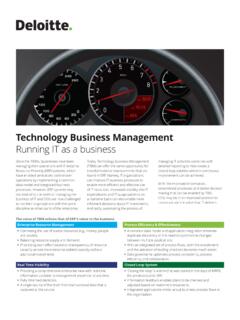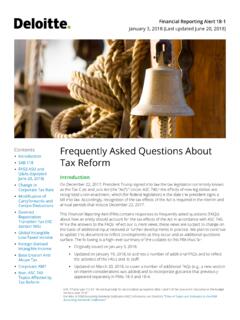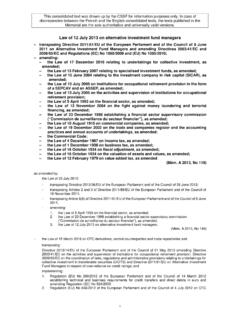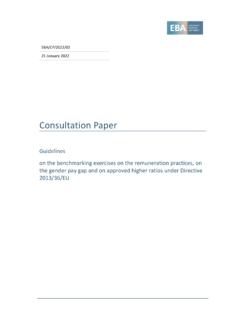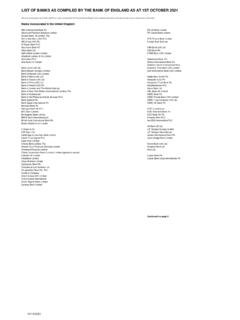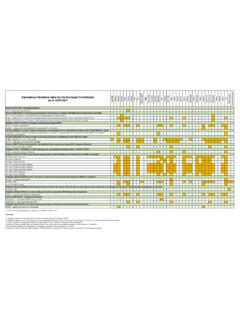Transcription of Deloitte Note: EBA Guidelines on outsourcing arrangements ...
1 00 Deloitte Note: EBA Guidelines on outsourcing arrangements (EBA/GL/2019/02) EBA Guidelines on outsourcing arrangements 01 Table of Contents 1 High-Level summary of the issued Guidelines 3 Executive summary 3 Background 4 Compliance and reporting obligations 5 Timings 5 2 Guidelines on outsourcing 6 Guidelines 1&2 - Proportionality: groups and institutional protection schemes 6 Assessment of outsourcing arrangements 6 Guideline 3 - outsourcing 6 Guideline 4 - Critical or important functions 7 Governance framework 7 Guideline 5 - Sound governance arrangements and third-party risk 7 Guideline 6 - Sound governance arrangements and outsourcing 8 Guideline 7 - outsourcing policy 8 Guideline 8 - Conflicts of interests 8 Guideline 9 - Business continuity plans 9 Guideline 10 - Internal audit function 9 Guideline 11 Documentation requirements 9 outsourcing process 10 Guideline 12 - Pre- outsourcing analysis 10 Guideline 13 - Contractual phase 12 Guideline 14 - Oversight of outsourced functions 14 Guideline 15 - Exit strategies 15 Guidelines on outsourcing addressed to competent authorities 15 02 outsourcing is a way to get
2 Relatively easy access to new technologies and to achieve economies of scale. EBA Guidelines on outsourcing arrangements EBA Guidelines on outsourcing arrangements 03 1 High-Level summary of the issued Guidelines Executive summary Financial institutions have been increasingly interested in outsourcing business activities in order to reduce costs and improve their flexibility and efficiency. In the context of digitalisation and the increasing importance of new financial technology (fintech) providers, financial institutions are adapting their business models to embrace such technologies. outsourcing is a way to get relatively easy access to new technologies and to achieve economies of scale. The responsibility of the institutions management body for the institution and all its activities can never be outsourced.
3 outsourcing is also relevant in the context of gaining or maintaining access to the EU s financial market. Critical Functions from a resolution perspective may also be outsourced but outsourcing arrangements should not create impediments to the resolvability of the institution. Institutions should be able to effectively control and challenge the quality and performance of outsourced functions and be able to carry out their own risk assessment and ongoing monitoring. Competent authorities are required to effectively supervise financial institutions outsourcing arrangements , including identifying and monitoring risk concentrations at individual service providers and assessing whether or not such concentrations could pose a risk to the stability of the financial system. To identify such risk concentrations, competent authorities should be able to rely on comprehensive documentation on outsourcing arrangements compiled by financial institutions.
4 Directive 2013/36/EU (Capital Requirements Directive; CRD) strengthens the governance requirements for institutions and Article 74(3) CRD gives the EBA the mandate to develop Guidelines on institutions governance arrangements . outsourcing is one of the specific aspects of institutions governance arrangements . Directive 2014/65/EU (Markets in Financial Instruments Directive; MiFID II) contains explicit provisions regarding the outsourcing of functions in the field of investment services and activities. Directive 2015/2366/EU (Revised Payment Service Directive; PSD2) sets out requirements for the outsourcing of functions by payment institutions. In order to make it even easier for competent authorities to effectively supervise outsourcing arrangements , the EBA has updated the Committee of European Banking Supervisors (CEBS) Guidelines on outsourcing ; the aim is to establish a more harmonised framework for all financial institutions that are within the scope of the EBA s mandate, namely credit institutions and investment firms subject to the CRD, as well as payment and electronic money institutions.
5 EBA Guidelines on outsourcing arrangements 04 The Guidelines include requirements that aim to ensure: a. effective day-to-day management and oversight by the management body; b. a sound outsourcing policy and processes that reflect the institution s strategy and risk profile; c. effective and efficient internal control framework; d. proper identification of critical or important functions and suitability of potential service providers; e. that all the risks associated with the outsourcing of critical or important functions are identified, assessed, monitored, managed, reported and, as appropriate, mitigated; f. protection of customer data across the whole institution, including the outsourced functions; g. appropriate plans for the exit from outsourcing arrangements of critical or important functions, by migrating to another service provider or by reintegrating the critical or important outsourced functions; and h.
6 Competent authorities remain able to effectively supervise institutions. The Guidelines will enter into force on 30 September 2019, with the 2006 Guidelines on outsourcing being repealed at the same time. Background The Guidelines specify the internal governance arrangements , including sound risk management practices, that institutions, payment institutions and electronic money institutions should implement when they outsource functions, in particular with regard to the outsourcing of critical or important functions. The Guidelines also specify how the arrangements should be reviewed and monitored by competent authorities, by fulfilling their duty to monitor the continuous compliance of entities to which these Guidelines are addressed with the conditions of their authorisation.
7 Institutions should comply with these Guidelines on a solo basis, sub-consolidated basis and consolidated basis. The application on a solo basis EBA Guidelines on outsourcing arrangements 05 might be waived by competent authorities. Payment institutions and Electronic money institutions should comply with these Guidelines on an individual basis. Competent authorities responsible for the supervision of institutions, payment institutions and electronic money institutions should comply with these Guidelines . Compliance and reporting obligations Competent authorities must notify the EBA that they comply or intend to comply with these Guidelines , or otherwise give reasons for non-compliance. In the absence of any notification by the deadline, competent authorities will be considered by the EBA to be non-compliant.
8 Any change in the status of compliance must also be reported to the EBA. Notifications will be published on the EBA website. Timings These Guidelines apply from 30 September 2019 to all outsourcing arrangements entered into, reviewed or amended on or after this date. For existing outsourcing arrangements institutions should review these with a view to ensuring that these are compliant with these Guidelines . Where the review of outsourcing arrangements of critical or important functions is not finalised by 31 December 2021, institutions should inform their competent authority of that fact, including the measures planned to complete the review or the possible exit strategy. Institutions should complete the documentation of all existing outsourcing arrangements , other than for outsourcing arrangements to cloud service providers, in line with these Guidelines following the first renewal date of each existing outsourcing arrangement, but by no later than 31 December 2021.
9 The Committee of European Banking Supervisors (CEBS) Guidelines on outsourcing of 14 December 2006 and the EBA recommendations on outsourcing to cloud service providers are repealed with effect from 30 September 2019. EBA Guidelines on outsourcing arrangements 06 2 Guidelines on outsourcing Guidelines 1&2 - Proportionality: groups and institutional protection schemes The Guidelines should apply on a sub-consolidated and consolidated basis, taking into account the prudential scope of consolidation. The EU parent undertakings should ensure that internal governance arrangements , processes and mechanisms in their subsidiaries are consistent, well integrated and adequate for the effective application of these Guidelines at all relevant levels. Institutions within groups using centrally provided governance arrangements should ensure among others that: group management retains full responsibility of compliance; outsourcing of operational tasks is effectively performed, monitored and audited; management body will be duly informed of relevant planned changes regarding service providers, including a summary of the risk analysis, including legal risks, compliance with regulatory requirements and the impact on service levels; all group institutions should receive a summary of the exit plan for critical or important functions.
10 Institutions, should also have regard to the principle of proportionality, to ensure that governance arrangements are consistent with: the individual risk profile; the nature and business model of the institution; the scale and complexity of their activities. Institutions should take into account: the complexity of the outsourced functions; the risks arising from the outsourcing arrangement; the criticality or importance of the outsourced function; the potential impact of the outsourcing on the continuity of their activities. Assessment of outsourcing arrangements Guideline 3 - outsourcing Institutions should establish whether an arrangement with a third party falls under the definition of outsourcing . As a general principle, institutions should not consider the following as outsourcing : a.





